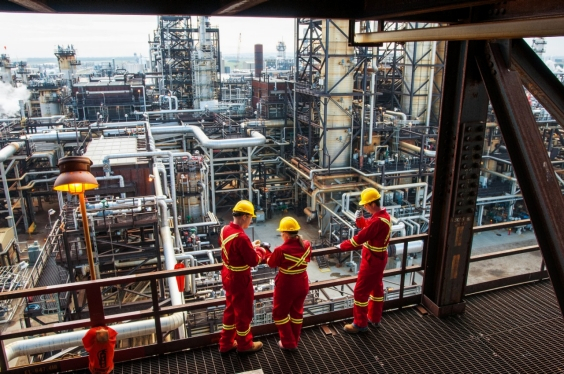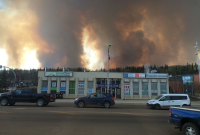Support strong Canadian climate journalism for 2025
The first oilsands mine shut down by wildfires in the Fort McMurray region a week ago has been restarted.
Shell Canada said Tuesday that it had resumed production at its Albian Sands mining operations about 95 kilometres north of Fort McMurray after a seven−day closure.
The operations, which include the Muskeg River and Jackpine oilsands mines, have the capacity to produce 255,000 barrels of oil a day, but Shell would say only that they were operating at a reduced rate.
The mines were closed to allow employees to tend to their families and to free up Shell’s work camp to accommodate some of the 80,000 people evacuated from Fort McMurray. Shell said the decision to restart was made because of improvements in air quality and weather and because the fire now is moving way from the site.
“Safe restart is important to our company and staff to allow us to contribute to the recovery efforts of the Fort McMurray area,” Zoe Yujnovich, Shell executive vice−president for oilsands, said in a statement.
“Safely resuming some of our operations will help us continue to provide fuel to the firefighters, ambulances, planes and others dedicated to the response efforts.”
Shell said it would fly staff in and out of the site to ramp up production over the coming days and weeks.
Analyst Nick Lupick of AltaCorp Capital estimated Tuesday that the shutdown of Imperial Oil Ltd.’s (TSX:IMO) Kearl oilsands mining project on Monday had increased the amount of production now offline in the oilsands to just over 1.1 million barrels per day. Kearl was producing about 200,000 barrels per day of bitumen.
Four of the five oilsands mining operations in the region were shut down due to the fire. The only one that didn’t close was the Horizon mine operated by Canadian Natural Resources Ltd. (TSX:CNQ).
Meanwhile, in a report Tuesday, commodities analyst Martin King of First Energy Capital said a decline in demand drove average Alberta gas prices down to 33 cents per thousand cubic feet on Monday, the lowest daily average price he can recall in at least 30 years.
Oilsands operations use a tremendous amount of natural gas to produce and process the bitumen and to provide power from gas−fired co−generation plants on site.
"They were already looking at weak prices from high storage in Alberta — high storage everywhere, really — and this is just, it’s not even the icing on the cake, it’s the icing on the icing on the cake in terms of bad prices," King said in an interview.
The oilsands shutdowns have reduced demand for natural gas in Alberta by 700 million to 900 million cubic feet per day, King estimated. That’s about 25 per cent of total gas demand in the province. He said the oilsands industry normally burns about 1.5 billion cubic feet per day of natural gas.
Prices are expected to improve as oilsands projects come back online but gas producers will likely remain under pressure, King said.
Shell said it sheltered more than 2,000 evacuees between last Tuesday and Saturday but all have since left. It said more than 8,000 individuals were evacuated from its airstrip on more than 80 flights during the same period.
-The Canadian Press



Comments